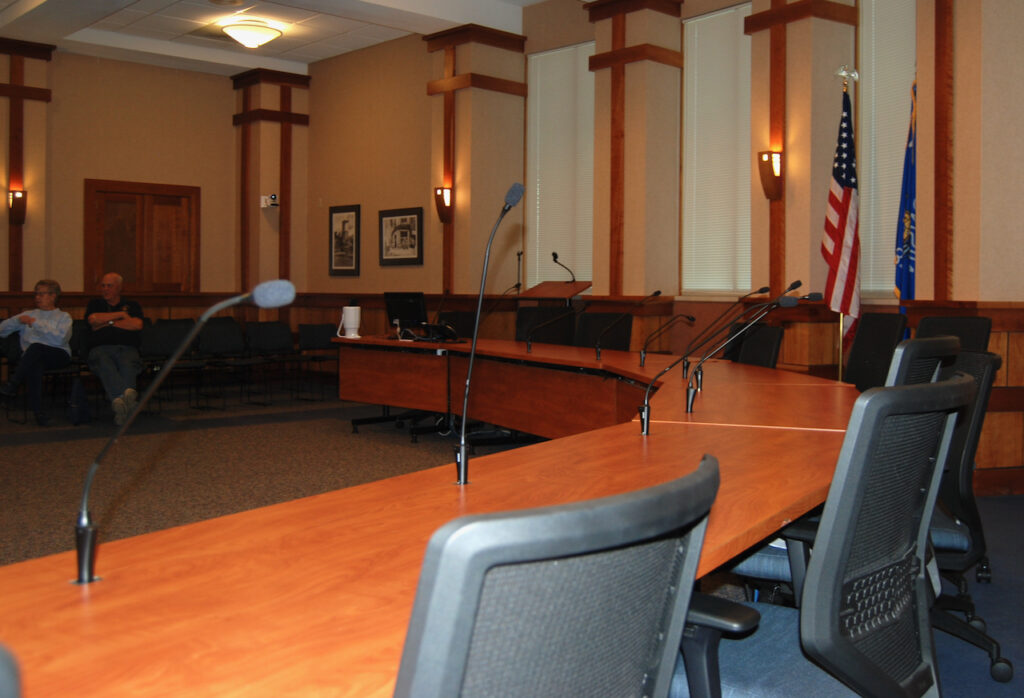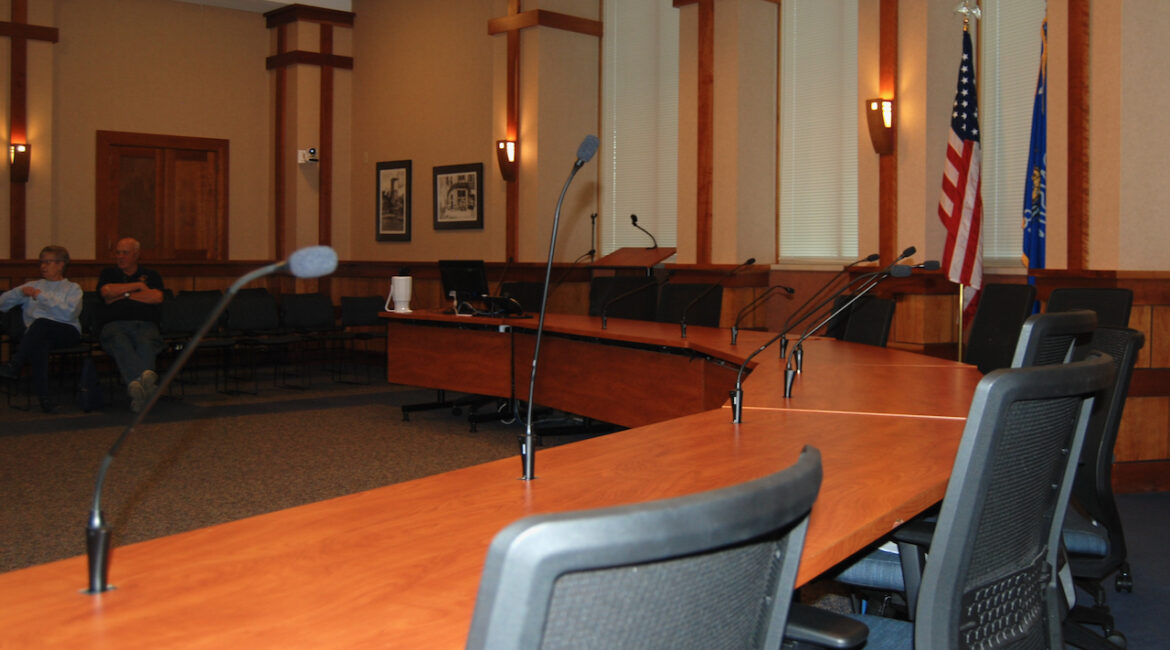By Kim McDarison
The Whitewater Common Council Tuesday voted to postpone an ordinance that would establish fines for individuals making “unnecessary or preventable” calls for emergency services.
Council voted unanimously in favor of postponing the ordinance’s first reading, asking staff to explore language that would make more specific the activities and their frequency that would precipitate the engagement of a penalty system using fines as a deterrent.
Whitewater Police Capt. Adam Vander Steeg introduced the ordinance to council Tuesday, noting that he was making the presentation on behalf of Whitewater Police Chief Dan Meyer who was on vacation.
According to Vander Steeg, the ordinance was being proposed to help EMS staff alleviate a burden created from an increasing number of calls for service which both the city’s police and fire and EMS department personnel have identified as unnecessary and preventable.
Vander Steeg said that the police department specifically had noted a significant increase in calls for service emanating from group home facilities.
As an example, he said, the police department was called to one address 76 times between June of 2021 and June of 2022. He said the numbers show that on average, the department was responding to the address one time every five days. At another address, he said, officers responded 34 times during the same time period.
Reading from a memo submitted to council by Meyer, Vander Steeg said “Many of these circumstances were preventable and did not require a response by an officer.”
The memo further noted that the department’s command staff had met with the owners of the two facilities to work through the concerns, and, according to the memo, “improvements have been noted.”
Said Vander Steeg, reading from the memo: “The intent is not to dissuade the public from calling for emergency services, rather we are simply requesting to have a tool that can address the truly egregious abuses that cause undue strain on our emergency services personnel.”
He emphasized that owners of the facilities mentioned in his examples, upon talking with police officers, were “very receptive” and “clearly understood our limited emergency services we have in the city.”
The ordinance would give the department tools would future owners not be as receptive to address future calls, he said.
Within the ordinance, calls that fit the definition of unnecessary or preventable included:
- Calls that do not require emergency service.
- Repeated calls that display a pattern indicating the home/care employee skill levels and capabilities do not align with the special needs fo the resident.
- Fire alarms caused by unattended, burned food.
- Fire alarms caused by detectors that have not been maintained.
- Fire alarms caused by excessive dust or a similar non-combustible trigger.
- 911 misdial/hangup calls.
- Runaway, elopement or missing resident calls.
- Lift assist calls not caused by a fall.
The ordinance outlined the following penalties for the listed offenses: First offense, not less than $100 or more than $300; second offense within one year, not less than $300 or more than $550, and for a third or subsequent offense within one year, not less than $500 or more than $700.
Council discussion
During discussion, councilman Greg Majkrzak asked about the process that would be used to initiate punitive action, asking: at what point would someone be citied for a violation?
Said Vanger Steeg: “I think we would handle it the exact same way we did when we started seeing continued issues in the community, where officers were responding when they shouldn’t be. And so the issue then was — us in the administration would have to have those meetings with owners and management to go over our concerns, to make sure that they clearly understand the burden they are putting on a lot of these emergency services, and tying up the personnel for a long period of time. Then I think at that point, if things don’t progress or get better or have a game plan, then this would be the recourse we would potentially use.”
Majkrzak expressed an interest in developing specifics, advancing the concept of “three strikes.”
“Actually that was part of one of the drafts. Ultimately, it was decided to take that out because it somewhat administratively burdens some, and ultimately what this type of ordinance does is it gives the officers discretion,” City Attorney Wally McDonell said.
Officers would have the discretion to give warnings, he added.
Majkrzak proposed that language within the ordinance could be changed, making the first offense a warning, “and then you escalate to a fine,” he said.
Said McDonell: “One of the problems with that is that the question becomes: Is it one individual at the — I don’t want to single out group homes, but it’s sort of a good example — if they get three calls from three different or the same employee, or three different group homes owned by one owner, just kind of sorting out who the warning is, and when you have your first strike, so to speak, was somewhat of a concern.”
Addressing his comments to Majkrzak, councilman Jim Allen said: “This could be used more against Hispanic people, or interpreted that way, if it’s used unequally. And I think that’s your concern, right?”
Majkrzak responded, saying: “I don’t want it to be a surprise — it won’t be a surprise in reality — but it could be a surprise in perception, to everyone else. Whatever criteria will justify the first penalty, which is not more than $300, or $100 and no more than $300, would be a warning instead.”
Said Allen: “It’s tough to create an ordinance that could be used against someone who doesn’t understand what they’re at fault for. Secondly, there are situations where they don’t have $300. … I don’t know. I think it needs a little more work.”
“How did you arrive at the specificity of this particular list of the definition of unnecessary or preventable calls? Was there a review of other municipalities, or a framework, or something hyper-local to what our departments here have been experiencing?” asked council president Lisa Dawsey Smith.
McDonell responded, saying: “both. It was probably more what this department is experiencing,” but, he said, other ordinances were consulted as resources.
Allen suggested looking at ordinances developed by other municipalities.
Councilwoman Jill Gerber suggested looking into language, especially that associated with criteria for “lift assist calls not caused by a fall,” that could exclude private residents and homeowners who did not live in group homes or assisted living facilities.
Dawsey Smith asked if the city’s departments are charging fees for lift assist services.
“My understanding is unless you are transported by the ambulance they are not charging,” Vander Steeg said.
Allen and Dawsey Smith both cited an earlier discussion — which they recalled may have taken place during negotiation meetings with fire department personnel before they were brought in house — revolving around calls for lift assists.
The fire department, which operated as Whitewater Fire Department, Inc., an independent nonprofit organization, was absorbed by the city as an in-house fire department in July.
Allen said he recalled that within that earlier discussion there were suggestions made that the city no longer provide assistance for calls concerning lift assists not caused by a fall.
“Definitely I think that falls should be paid for. If they (group home and assisted living facilities) are just using us for that, they have the training, they have the equipment, they want to continue to use us … then we have to collect what it costs us back,” Allen said.
McDonell said city staff could look at developing a policy that would address lift assists using a fee for service rather than include it within a policy that establishes a penalty for misuse.
Allen said that while he agreed with the need for an ordinance, he would not support it in the form in which it was presented.
Council voted to postpone the ordinance with the understanding that it would reappear before them at a “further date.”

Whitewater council chambers, file photo/Kim McDarison.
This post has already been read 1319 times!
